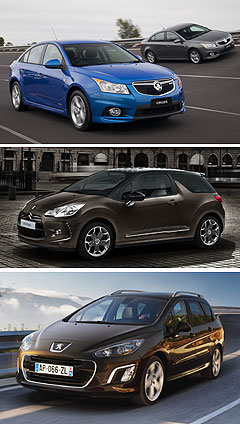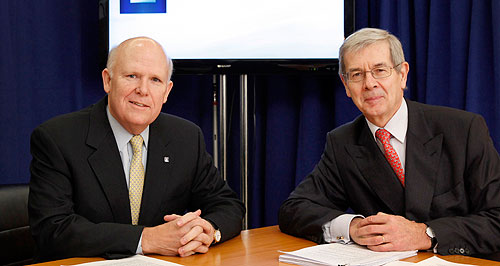Make / Model Search
News - General MotorsGM and Peugeot-Citroen join forcesBon amis: GM's Dan Akerson (left) and PSA's Philippe Varin after signing the historic co-operation deal in Paris. Giant global alliance created as GM and PSA Peugeot-Citroen share platforms, parts1 Mar 2012 GENERAL Motors will buy a seven per cent slice of Europe’s second-biggest vehicle-maker, PSA Peugeot Citroen, under a new global alliance designed to slash vehicle costs by $US2 billion ($A1.86b) within five years. The companies will share car platforms from 2016 and join forces in a global purchasing joint venture worth $US125 billion ($A116b) a year to help sharpen the profitability of both companies – two of the best-known and oldest automotive giants in the world. Initially, the model-sharing focus will be on small and midsize passenger cars, MPVs and crossovers. “The companies will also consider developing a new common platform for low-emission vehicles,” the official joint statement said. This new arrangement has the potential to dwarf the other big global alliance between France’s other major manufacturer, Renault, and Japan’s number two car-maker, Nissan. GM and PSA combined sell 12.6 million vehicles globally, compared with eight million for Renault-Nissan. The new deal – announced in Paris last night – is expected to have little visible affect in the showrooms, but raises questions about the knock-on effect for PSA’s current partners Mitsubishi, Fiat, Ford and BMW, not to mention GM’s shakey European operations at Opel and Vauxhall.  From top: Holden Cruze, Citroen DS3 and Peugeot 308 SW. From top: Holden Cruze, Citroen DS3 and Peugeot 308 SW.PSA is a direct competitor for Opel and Vauxhall, producing a similar range of small cars, medium cars and light commercial vehicles. German-based Opel is the development centre for GM’s global compact and medium-car platforms such as Delta – the basis for the super-successful Cruze and Astra. But the two companies were at pains to say the alliance would not replace their independent efforts to return their European operations to sustainable profitability, saying savings would not start flowing for at least two years. In their joint announcement, the companies indicated the arrangement is likely to be expanded into other areas of co-operation, including joint transport operations. However, the statement appears to leave the door open for joint manufacturing, which could have profound affects on European vehicle production. Opel’s plants in Europe are said to be running at far below capacity, while PSA is also struggling to maintain production levels in the current gloomy European economic conditions. Pooling factories could mean mass closures of production lines – a move that GM executives have already hinted may be necessary to save the loss-making Opel and Vauxhall operations, which GM tried to sell off at the height on the global financial crisis. The agreement – GM’s second attempt at an alliance with a European manufacturer after its ill-fated partnership with Fiat in the 1990s – was signed by GM chairman and CEO Dan Akerson and PSA Peugeot Citroën managing board chairman Philippe Varin. “This partnership brings tremendous opportunity for our two companies,” Mr Akerson said. “The alliance synergies, in addition to our independent plans, position GM for long-term sustainable profitability in Europe.” Mr Varin said: “This alliance is a tremendously exciting moment for both groups and this partnership is rich in its development potential. “With the strong support of our historical shareholder and the arrival of a new and prestigious shareholder, the whole group is mobilised to reap the full benefit of this agreement.” Under the deal, GM will buy seven per cent of PSA for an undisclosed amount, becoming the second-biggest shareholder in the French company behind the Peugeot Family Group. As well, PSA is expected to raise approximately €1 billion ($A1.24b) through a capital increase with preferential subscription rights for shareholders of PSA Peugeot Citroen, underwritten by a syndicate of banks. The Peugeot Family Group will sign up for a chunk of those rights “as a sign of their confidence in the success of the alliance”. Under the terms of the agreement, GM and PSA will not only share platforms but also modules and components “to achieve cost savings, gain efficiencies, leverage volumes and advanced technologies, and reduce emissions”. “Sharing of platforms not only enables global applications, it also permits both companies to execute Europe-specific programs with scale and in a cost-effective manner,” the statement says. Currently, PSA has a model-sharing arrangement with Mitsubishi, with PSA rebadging vehicles such as the all-electric i-MiEV and Outlander compact SUV as Peugeots and Citroens. As the latest announcement states that crossovers will be part of the model-sharing arrangements, along with low-emissions vehicles, the long-term future of the Mitsubishi arrangement seems doomed. PSA also has had a powertrain-sharing deal with BMW, for vehicles such as the Mini and Citroen DS3, although that would seem less problematic for both parties. A global steering committee has been established that includes an equal number of senior leader representatives from both companies, but the deal’s implementation is subject to regulatory approvals as well worker approval.  |
Click to shareGeneral Motors articlesMotor industry news |









Facebook Twitter Instagram